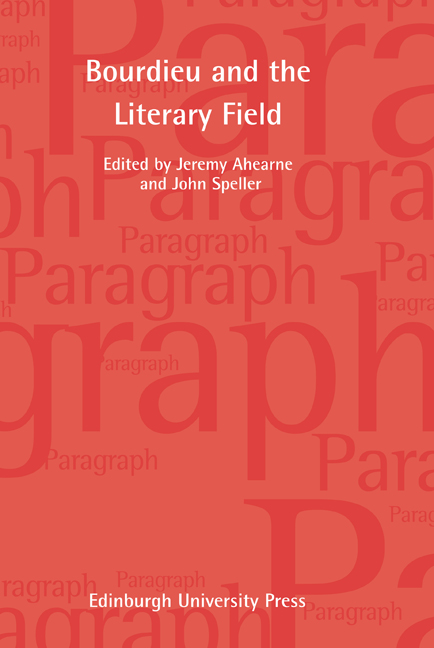Book contents
- Frontmatter
- Contents
- Introduction: Bourdieu and the Literary Field
- How Field Theory Can Contribute to Knowledge of World Literary Space
- Autonomy Revisited: The Question of Mediations and its Methodological Implications
- The Literary Field and the Field of Power: The Case of Modern China
- Between Repression and Anamnesis: Pierre Bourdieu and the Vicissitudes of Literary Form
- Reading and Reflexivity: Bourdieu’s Faulkner
- Fields and Fragments: Bourdieu, Pascal and the Teachings of Literature
- On an Enigmatic Text by Pierre Bourdieu
- Apollinaire, Autumn Ill
- Notes on Contributors
On an Enigmatic Text by Pierre Bourdieu
Published online by Cambridge University Press: 17 September 2020
- Frontmatter
- Contents
- Introduction: Bourdieu and the Literary Field
- How Field Theory Can Contribute to Knowledge of World Literary Space
- Autonomy Revisited: The Question of Mediations and its Methodological Implications
- The Literary Field and the Field of Power: The Case of Modern China
- Between Repression and Anamnesis: Pierre Bourdieu and the Vicissitudes of Literary Form
- Reading and Reflexivity: Bourdieu’s Faulkner
- Fields and Fragments: Bourdieu, Pascal and the Teachings of Literature
- On an Enigmatic Text by Pierre Bourdieu
- Apollinaire, Autumn Ill
- Notes on Contributors
Summary
Abstract:
A largely unknown commentary by Pierre Bourdieu on the poet Guillaume Apollinaire allows us to explore the non-theoretical, and even non-theorized, aspects of the relationship between the sociologist and literature. The present article begins by analysing Bourdieu's 1995 text as an example of close reading or explication de texte emerging, as it were, from a ‘scholastic unconscious’ dating from the 1950s. The article then proceeds to look at other ways in which Bourdieu has had recourse to literary references in his work (as a repertoire of techniques, as rhetorical elements for an argument from authority, as an equivalent or approach to sociological analysis, as ethical models or invocations). The article argues that, over and beyond his sociological objectification of literature, Bourdieu entertained a range of other relations to literature. These cannot be subsumed under a single theoretical system, but emerge at different times and with different, sometimes apparently ‘anachronistic’, effects.
Keywords: literature, sociology, Pierre Bourdieu, Apollinaire
‘It goes without saying that we are right to expect—and that I expect—from literature much more than the revelation of the “real”.’ (Pierre Bourdieu)
Among the innumerable texts that Pierre Bourdieu devoted to literature, a short four-page article, in my opinion, deserves particular attention. It is not a synthetic formulation of his sociology of fields, nor even an analysis that exemplifies his method. Published in 1995, the article in question is a commentary on a poem by Apollinaire entitled ‘Automne malade’ (‘Autumn Ill’), and included in Alcools (1912).It appears in the Bibliographie des travaux de Pierre Bourdieu, compiled by Yvette Desault and Marie-Christine Rivière,but it has never for all that been mentioned by sociologists of literature.
This invisibility is not in itself surprising, when one considers that Bourdieu's oeuvre comprises several hundred titles. From this point of view, ‘Apollinaire, Automne malade’ simply shares the fate of several other rarely cited texts.What makes these four pages so unique, and so disorienting for a reader familiar with the sociologist's work, is something else. One could speak of a shift in perspective from his usual analysis, or of a break in tone. But then one would forget that the article mobilizes notions developed elsewhere in his oeuvre, and that it is therefore, on certain points, very much in conformity with what one might expect from a text signed by Bourdieu.
- Type
- Chapter
- Information
- Bourdieu and the Literary FieldParagraph Volume 35, Number 1, pp. 115 - 130Publisher: Edinburgh University PressPrint publication year: 2020



